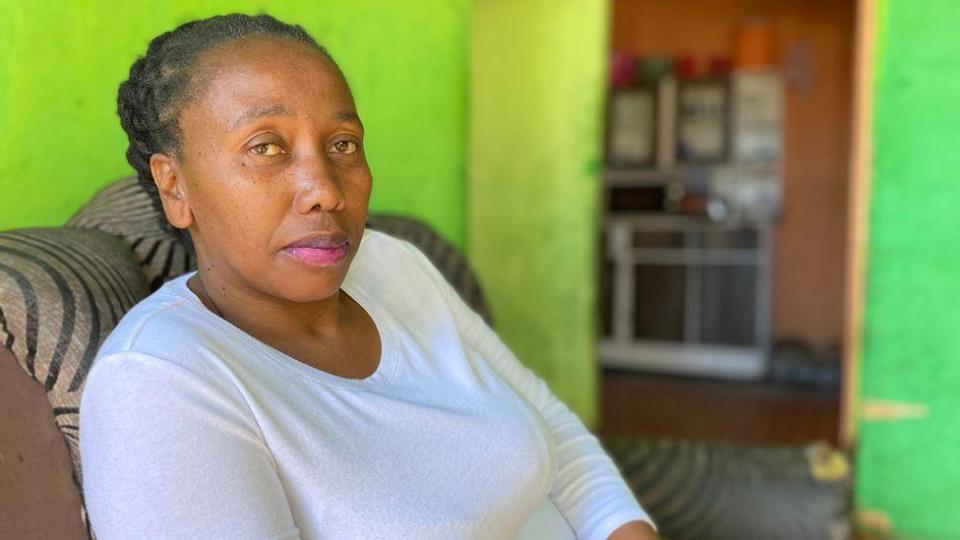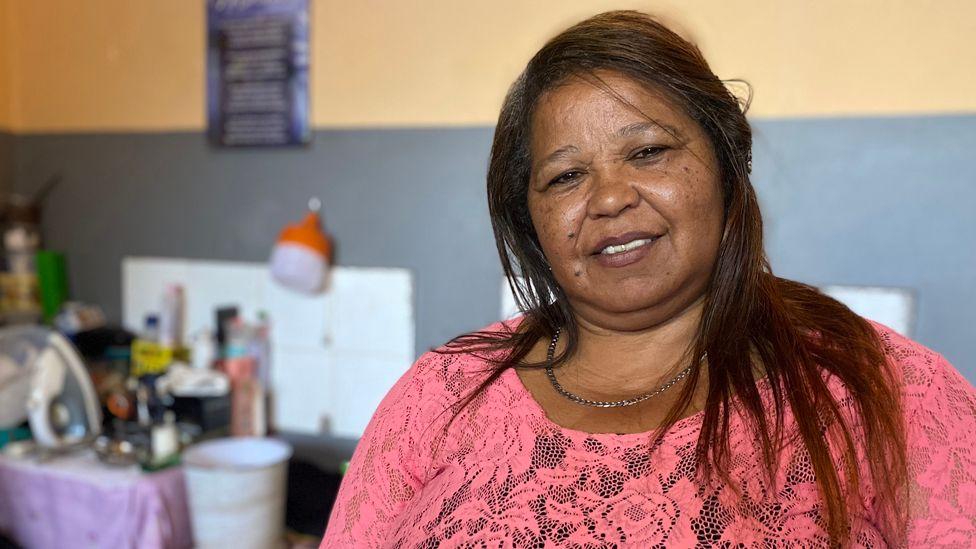Jameelah’s space was as soon as a morgue; Faldilah’s was a restroom; Bevil’s – the physician’s workplace where he concerned gather his diabetes medication.
All of them are crouching in a run-down health center in the South African city of Cape Town, objecting at what they view as the federal government’s failure to provide economical real estate.
Completion of apartheid brought political rights and liberties for all. However on the eve of the nation’s seventh democratic election, withstanding inequality still divides this nation.
And in a lot of cases the real estate policies of the governing African National Congress (ANC) has actually unintentionally enhanced the location of apartheid, instead of reversed it.
Activists coming from a motion called Reclaim the City inhabited the Woodstock Healthcare facility in the dead of night 7 years back.
The goal was to take control of residential or commercial property near the city centre, states among the leaders, Bevil Lucas, due to the fact that access to the tasks and services this provides is essential to righting the wrongs of partition.
“A brand-new type of financial apartheid” has actually changed the racist laws that kept black and coloured individuals (as mixed-race South Africans are understood), caught in hardship in areas at Cape Town’s edges, he informs the BBC.
“The bad and susceptible have actually normally been pressed to the periphery of the city.”
They now deserve to move however cannot pay for the high leas required by residential or commercial property designers in the city centre.
For Jameelah Davids, place was whatever.
“My relocating here was due to the fact that of my boy who’s autistic,” she states. “He goes to school around the corner. It was so near for him. Whatever exists. And he’s thrived.”
She settled her household in the previous workplace of the health center morgue.

Another renter, Faldilah Petersen revealed me how she has actually changed a medical facility restroom into a home, turning the toilet cubicle into a cooking area, and the basin location into a bed room.
“I was forced out like 10 times in a year,” she informs me.
“However residing in this profession offered me that chance to enhance my life, and I’m more complimentary to do what I require to and it’s far more nearer to the city too. It’s like a homecoming.”
The city authorities have actually come round to concurring that the website can be established for domestic functions, however it calls the existing occupants prohibited occupiers and states they require to leave before the advancement begins.
The ANC took power thirty years ago with a Liberty Charter that guaranteed real estate to a population denied of safe and comfy homes by apartheid. Ever since, it has actually developed more than 3 million and given ownership free of charge, or for lease at listed below market rates.
However the lists for federal government homes are still long – Ms Davids has actually been awaiting almost thirty years, Ms Petersen for longer.
And many have actually been developed far from the city centre, where land is more affordable, stopping working to reverse the spatial preparation of apartheid that embedded inequalities.
No Place is that more the case than Cape Town, states Nick Budlender, a metropolitan policy scientist, calling it “most likely the most segregated city location anywhere in the world”.
It was the entry point for colonial inhabitants and they developed it that method, he states, so reversing it would take purposeful state intervention. However “given that completion of apartheid, not a single economical real estate system has actually been integrated in the central city of Cape Town”.
He is offering me a trip of parking area that keep federal government automobiles, some event dust, targeted by activists as readily available public land that might be changed into low-income real estate.
“Utilizing a piece of land in the centre of the city that struggles with such a serious partition crisis to keep automobiles rather of supplying homes… makes no sense from anybody’s viewpoint,” states Mr Budlender.
There are indications of a brand-new method. The provincial federal government, run by the Democratic Alliance (DA) is constructing a “much better living” design on state land near the city’s tasks and services.
The Conradie Park job likewise occurs to be the website of a previous health center.
The very first stage provides a mix of subsidised and market-value choices, and the 2nd stage is under building.
Provincial Facilities Minister Tertuis Simmers does acknowledge a stockpile of 600,000 individuals awaiting real estate help, however states there are “enthusiastic” strategies to provide 29 comparable social real estate jobs.
However the spending plans are little – he is looking for collaboration from the economic sector – and timelines unsure.
And real estate, typically a hot subject in elections, has actually slipped down the list of political top priorities.
The manifesto of the DA, which is the main opposition celebration at the nationwide level, does not particularly discuss it, nor do other celebrations.


In the narrow lanes of Khayelitsha area, expect the future remains in brief supply.
A number of those residing in the stretching crush of corrugated iron shacks leave in the past dawn to commute to the city for work the method their moms and dads and even grandparents did.
It is a journey of about 30km (18 miles), however the mini-bus taxis and trains they utilize are pricey, undependable and typically hazardous.
Noliyema Tetakome has actually lived here for the majority of her 49 years. She gets water from the common tap at the end of her street and utilizes the general public latrines.
She invests a quarter of her meagre income on transportation to her task as a garden enthusiast. A few of her neighbours pay up to half of theirs. And she does not anticipate the election to alter that.
Ms Tetakome has actually marked her X on the tally in every election up until now however “it doesn’t makes any distinction”, she informs me.
This time “I’m not going to vote”, she states leaning forward in her chair for focus, “due to the fact that I’m exhausted. Due to the fact that I voted in the past, however I didn’t see modification. I’m still here!”
The main point on her mind is the coming winter season rains which she anticipates to flood her shack once again.


Disillusionment with the governing ANC recommends the celebration of freedom might for the very first time lose the outright bulk it has actually commanded given that 1994.
The third-largest celebration, the Economic Liberty Fighters (EFF), is challenging what it calls years of ANC failure by providing an extreme “rescue strategy” to rearrange the bulk of the wealth still held by a little minority.
A brand-new celebration, Increase Mzansi, has actually used Cape Town’s consistent departments.
“Our company believe that South Africans need to have the ability to remain closer to where they work,” the nationwide leader Songezo Zibi stated just recently on a project go to, implicating both the DA and ANC of stopping working to do the sort of spatial preparing the fast-growing city requirements.
Increase Mzansi is untried however comes without the luggage of misused power that hobbles the ANC, the sweeping corruption that has actually darkened its years of guideline.
“The powers that be are too carefully connected with residential or commercial property power,” states Mr Lucas, talking with me while set down on his bed in confined living quarters, a space where he utilized to consult his physician.
A previous anti-apartheid activist who never ever stopped marketing for social justice, he states he is dissatisfied in the result of the battle, however firmly insists the future still has possibilities.
“Due to the fact that it’s an election, there’s hope, which did not exist under the previous dispensation.”
He still hopes that the political authorities will address the scale of social requirement that stays the tradition of apartheid.
“If it’s not effectively resolved,” Mr Lucas states “it might result in social discontent, and considerable social discontent. Due to the fact that what do individuals need to lose when they are currently homeless, when they are unable to have shelter?”




Go to BBCAfrica.com for more news from the African continent.
Follow us on Twitter @BBCAfrica, on Facebook at BBC Africa or on Instagram at bbcafrica
